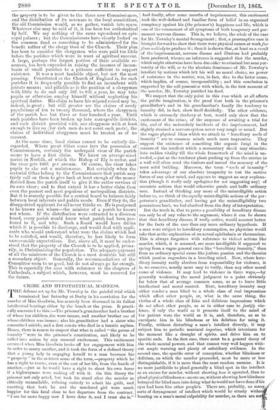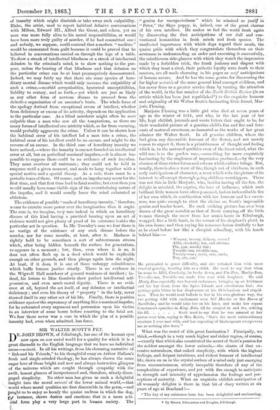CRIME AND HYPOTHETICAL MADNESS.
THE defence set up for Mr. Townley in the painful trial which terminated last Saturday at Derby in his conviction for the murder of Miss Goodwin, has scarcely been discussed in its fullest intellectual bearings either by the bench or the press. It practi- cally amounted to this :—The prisoner's grandmother had a brother of whose ten children five were insane, and another brother one of whose children was insane ; also his grandfather had a sister who committed suicide, and a first cousin who died in a lunatic asylum. Hence, there is reason to suspect that what is called "the germs of insanity" were in the prisoner's constitution, and likely to be called into action by any unusual excitement. This excitement occurrsd when Miss Goodwin broke off her engagement with him in order to marry another, and it took the form of a defined theory that a young lady in engaging herself to a man becomes his- " property " in the strictest sense of the term,—property which he has a right to rescue, even at the cost of her life, from the hands of another,—just as he would have a right to shoot his own horse if a highwayman were making off with it. On this theory the prisoner not only acted, but took his stand after the murder as ethically unassailable, refusing entirely to admit his guilt, and asserting that both he and the murdered girl were much happier for this fatal close to her departure from the contract. "1 am far more happy now I have done it, and I trust she is." And finally, after some months of imprisonment, this excitement took the well-defined and familiar form of belief in an organized
conspiracy against his (the prisoner's) happiness and life, which is
one of the commonest of all symptoms of both temporary and per- manent nervous disease. This is, we believe, the whole of the case
for Mr. Townley's mental derangement ; first, a presumptive case is
brought forward to show that there were physical causes at work/ear from unlikely to produce it ; then it is shown that, at least as a result of the imprisonment, nervous disease and illusions had probably
been produced, whence an inference is suggested that the murder,
which might otherwise have been due either to criminal but sane per- versity of the will, or to the absolute dominance of Mr. Townley's
intellect by notions which left his will no moral choice, no power of resistance in the matter, was, in fact, due to the latter cause, which implies, of course, irresponsibility ; and this conclusion is supported by the self-possession with which, in the first moment of the murder, Mr. Townley justified his deed.
We suspect that the only point in this case which at all affects the public imagination, is the proof that both in the prisoner's grandfather's and in his grandmother's family the tendency to insanity did, in fact, show itself decidedly. The other evidence, which is extremely shadowy at best, would only show that the excitement of the crime, of the suspense of awaiting a trial for life, and of the melancholy incidents of th3 imprisonment, had slightly strained a nervous system never very tough or sound. But the vague physical ideas which we attach to "hereditary seeds of insanity" are to common minds much more impressive. They
suggest the existence of something like organic fungi in the corners of the intellect which a momentary shock may stimulate into sudden vitality till the whole framework of the mind is un- roofed,—just as the tenderest plant pushing up from the crevice in a wall will often rend the timbers and unroof the masonry of the most solid building. Moreover, the term "seeds of in sanity" takes advantage of our absolute incapacity to test the motive forces of any other mind, and appears to suggest an easy explana- tion (though it really only apologizes for not suggesting any)of eccentric actions that would otherwise puzzle and baffle ordinary men. Instead of thinking any more of the unintelligible action before 113, we think of the equally unintelligible actions of the per. petrator's grandfather, and having got the unintelligibility two generations back, we feel absolved from the duty of interpretation.
But the truth is, that to prove a possibility of hereditary disease can only be of any value to the argument, where it can be shown that that hereditary disease, if really active, would account better for the facts of the case than any more ordinary hypothesis. If a man were subject to hereditary consumption, no physician would take that as the explanation of an actual ophthalmia or rheumatism. This is always forgotten with reference to violeut actions like murder, which, it is assumed, are more intelligible if supposed to spring from a vague general cause like "hereditary insanity," than from an ordinary special cause like jealous passion and the theories which passion engenders iu a brooding mind. Now, where here- ditary insanity really absolves from responsibility for violence, it is, we conceive, usually more easy to verify, than any other moral cause of violence. It may lead to violence in three ways,—by generally weakening the moral judgment to a point obviously far below that of average common sense, so as to leave little intellectual and moral control. Next, hereditary insanity may either render a man blind to a whole class of real impressions which affect other people, or, what is the same thing, the victim of a whole class of false and delirious impressions which do not affect other people, so as in either case to justify vio- lence, if only the world as it presents itself to the mind of the patient were the world as it is, and, therefore, so as to exculpate him in his blindness or his delirium for using it. Finally, without disturbing a man's intellec.t directly, it may subject him to periodic maniacal impulses, which intoxicate for the moment like a draught of spirits, and drive him on to specific ends. In the first case, there must be a general decay of the whole mental powers, aud that cannot very well happen with- out ample warning and plenty of subsidiary evidence. In the second case, the specific error of conception, whether blindness or delirium, on which the murder proceeded, must be more or less
distinguishable, if it is more than the most random surmise. It is no more justifiable to "plead generally a blind spot in the intellect
as an excuse for murder, without showing how it operated, than to
plead physical blindness as an excuse, without showing how blindness betrayed the blind man into doing what he would not have done if his eyes had been like other people's. There are, probably, as many sorts of derangement of intellect which would be utterly witho bearing on a man's moral culpability for murder, as there are
of insanity which might diminish or take away such culpability. Blake, the artist, used to report habitual delusive conversations with Milton, Edward HI., Alfred the Great, and others, yet no man was more fully alive to his moral responsibilities, or would have been more truly guilty of murder, if he had committed one ; and nobody, we suppose, could contend that a modern " medium " would be exonerated from guilt because it could be proved that he believed in conversations carried on through the legs of a table. To show a streak of intellectual blindness or a streak of intellectual delusion in the criminal's mind, is to show nothing to the pur- pose, unless the bearing of that blindness and that delusion on the particular crime can be at least presumptively demonstrated. Indeed, we may fairly say that there are some species of here- ditary mental disease which would only increase the culpability of such a crime,—morbid scrupulosities, hysterical susceptibilities, liability to ecstasy, and so forth,--yet which are just as likely as any other form of nervous disease to proceed from the defecth e organization of an ancestor's brain. The whole force of the apology derived from exceptional errors of intellect, whether from deficiency or excess of its activity, depends on the application to the particular case. As a blind murderer might often be more culpable than a man who saw all the temptations, so there are many forms of intellectual eccentricity which, so far from excusing, would probably aggravate the crime. Unless it can be shown how the habitual error of his intellect led a man into a crime, the habitual error of his intellect could be no excuse, and might be the reverse of an excuse. In the third case of hereditary insanity we have noticed,—where the insanity is one not founded on intellectual error at all, but on periodical maniacal impulses,—it is almost im- possible to suppose there could be no evidence of such impulses. They must overbear all resistance ; they could not be held in suspense until a given moment, and made to hang together with a special motive and a special theory. As a rule, there must be a periodic trace of them. Of course, such an impulse may occur for the first time, and that first time lead to fatal results; but even then you would usually have some visible sign of the overwhelming nature of the impulse, and it would usually leave the mind exhausted or oblivious.
The evidence of possible "seeds of hereditary insanity," therefore, seems to exercise more power over the imagination than it ought. The case is, we imagine, very rare indeed in which an hereditary disease of this kind having a practical bearing upon an act of violence would not give plenty of proof of its existence besides the particular act in question. In Mr. Townley's case we fear there is no vestige of the existence of any such disease before the murder, nor for some months, at least, after it. Madness is rightly held to be sometimes a sort of subterranean stream which, after being hidden beneath the surface for generations, re-appears in a moment ; but, then, even where it is so, it
does not often flash up in a deed which would be explicable enough on other grounds, and then plunge again into the night.
At least, if it does, it is one of those unhappy coincidences which baffle human justice utterly. There is no evidence in the Wig-well Hall murderer of general weakness of intellect ; in-
deed, his letters to Miss Goodwin show perfect intellectual self-
possession, and even much moral dignity. There is no evid- ence at all, beyond the act itself, of any delusion or intellectual deficiency ; and even his theory of " property " in the lady, never showed itself in any other act of hi ti life. Finally, there is positive
evidence against the supremacy of anything like a maniacal impulse, for he exhausted every argument and persuasion upon his victim
in an interview of some hours before resorting to the fatal act. We fear there never was a case in which the plea of a possible insanity had, even when admitted, less force.



































 Previous page
Previous page